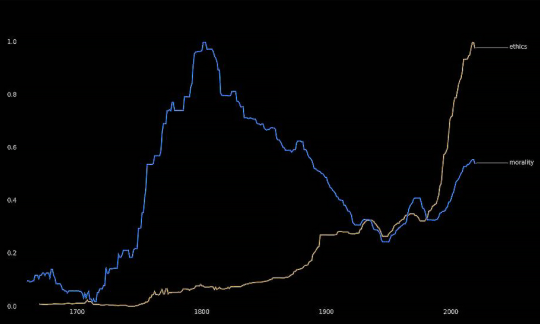#ngrams
Explore tagged Tumblr posts
Text
Did you know that usage of the word "the" in English has declined by one third in the last two hundred years?
In 1820, the comprised 6.17% of all written words in English, while in 2019, the percentage had declined to 4.17!
Considering that "the" is the most common word in English and that it is so grammatically essential, this is wild!
2 notes
·
View notes
Text
Today's linguistics adventure: early uses of the word "blog".
I was back-browsing xkcd, as you do, and 1043 is this:
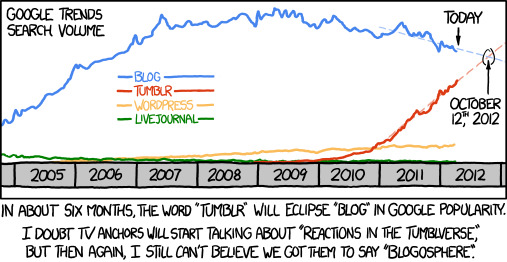
And given the...subsequent developments about Tumblr, I decided to make the equivalent graph today. I eventually found Google Trends, which I don't think is tracking exactly the same thing, but seems pretty compatible:
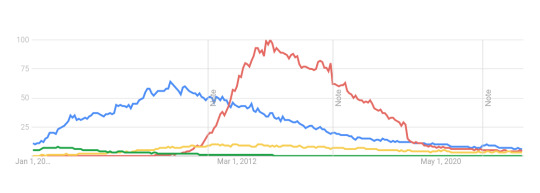
(And it's surprising to me, how long and how late Tumblr had more google searches than blog. I guess people stopped searching "blog" because everything was a blog?)
But before that I reached for ngram viewer, and got something interesting.

In this case, the interesting thing isn't the comparison; everything except blog is a visual flatline.
The interesting thing is, this search defaults to start from 1800. Why are there any hits at all? What's going on with that bump in the 1920s? (And a smaller one in the 1860s.)
Let's trim the ending of the series. We get this:
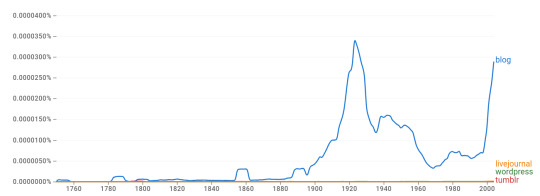
(Note this means that "blog" was more popular in the corpus in 1920 than in 2004, which seems rather improbable.)
Ngram viewer is drawing from the Google Books corpus, which is, you know, directly searchable. So I looked for hits for "blog" between 1900 and 1940. And the first valid-looking hit is from page 6 of that classic work of literature, Over-the-counter Brokers and Dealers Registered with the Securities and Exchange Commission as of January 31, 1936:
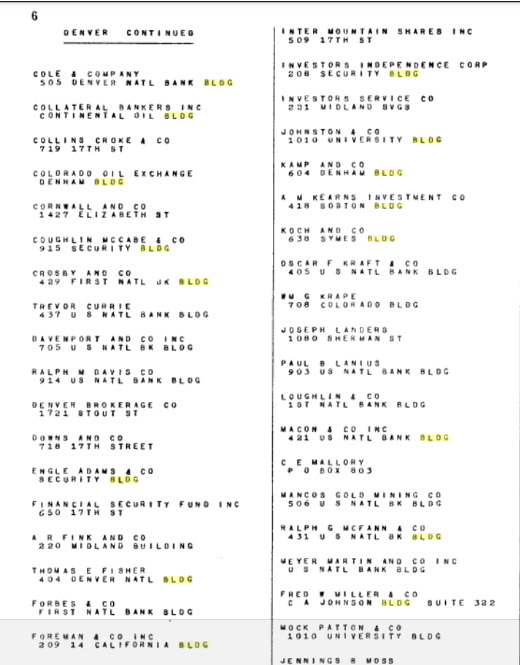
Ah. Problem solved?
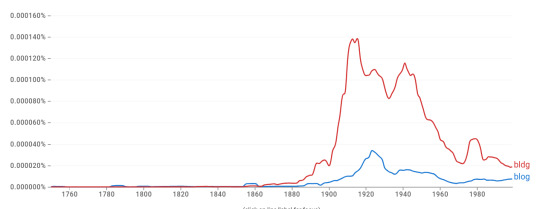
Almost! But now I wanna know what those other two, earlier bumps, are. In 1822 there's an arithmetic book that has stuff like this:

and it does seem like there are a lot more hits like that; I don't know why they're localized to the 1800s though. I think all the early bumps might be from that, though.
242 notes
·
View notes
Text

Fiona vs FIONA ngram [x]
22 notes
·
View notes
Text
#like I canjot stress to you that a clavichord would be a Strange thing for a 30 year old naval Lieutenants to own in the 1840s#but ALSO the use of 'clavier' as a catch-all term for a keyboard instrument was pretty obsolete by that time#as best I can tell from google ngram and also from my personal experience reading contemporary sources talking about the piano#idk man#the terror#george hodgson#Been doing a lot of googling about Baroque keyboard instruments lately. Which was actually fully unrelated to The Terror believe it or not
7 notes
·
View notes
Text
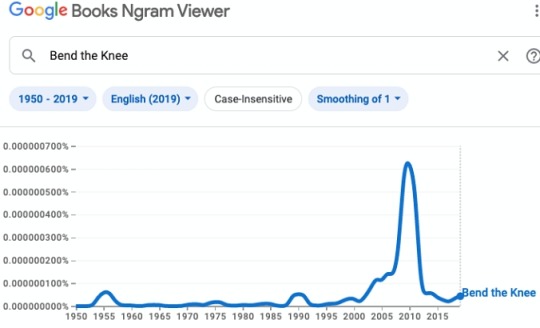
The expression "bend the knee" certainly existed long before ASoIaF. But since the first book was published on 06 August 1996 its use in English has soared.
Google Books Ngram Viewer, of course, only covers books. So there was a dip after the publication of A Dance of Dragons in 2011. Though because of the HBO series the expression has entered the general lexicon and is being used by people who've neither read ASoIaF nor seen GoT. So as of 2019, the current end date of Ngram searching, it was moderately trending upwards again.
The mass worldwide web, at least Net 1.0, began around 1995. That's slightly before the time A Game of Thrones was published. So there's not much data prior to its publication to compare online use of "bend the knee" before its release and after. But use of the phrase is now extremely common – particularly in political discussions. Mainstream legit news media use it unselfconsciously.
It seems to be used particularly often in connection with a certain US political figure.

However, with several criminal cases facing him this year, another GoT phrase may apply to him: Winter is Coming for Donald Trump.
#game of thrones#house of the dragon#asoiaf#bend the knee#language#google books ngram#donald trump#gra o tron#trône de fer#kampen om jerntronen#pemainan takhta#a guerra dos tronos#juego de tronos#trono di spade#taht oyunları#trò chơi của ngai#valtaistuinpeli#hra o trůny#isang kanta ng yelo at apoy#гра престолів#왕좌의 게임#权力的游戏#ゲームの玉座#صراع العروش#গেম অব থ্রোনস#تخت کے کھیل#गेम ऑफ़ थ्रोन्स#சிம்மாசனத்தில் விளையாட்டு#משחקי הכס#игра престолов
23 notes
·
View notes
Text
The oddest thing about the Republican Party and their response across all channels to the SOTU (last night) is how Republicans suddenly care so much about Haiti... About how sleepy Joe needs to "look to Haiti" (most common n-gram)... (Context: Haiti 🇭🇹 is currently an incredibly violent place with armed gangs engaging in a civil war to overthrow the PM -- who isn't in Haiti at the moment -- currently much of the fighting is their attempt to take Port-au-Prince's Toussaint Louverture International Airport.)
iirc the last time the most Russia-aligned political party used "Look to ———" as a talking point, it was "Look to Libya" 🇱🇾 in the 3 months prior to the Benghazi attacks, after Republicans uniformly decried Obama's use of military force in Libya as "an affront to our constitution" (another n-gram).
Earlier this week Biden slipped additional USMC MSCEG into Haiti, including FAST (Fleet Anti-terrorism Security Teams), without telling anyone or making a fuss about it -- or at least Republicans haven't gotten the memo. Expect a Haitian Benghazi-attempt in 3 months, approximately July 4th - August 8th.
While it seems to have been an attempt, Benghazi itself didn't derail Obama's reelection in 2012 (but it kept Republicans distracted and busy for a while). People forget that the future #45 was a presidential candidate for the 2012 elections, using the slogan MAG "Make America Great" (reused in 2016 as MAGA), but that he dropped out (Loser) ...to Mitt Romney! If you look at what Republicans were most mad about, about Benghazi, it's about the purported cover-up and how the attack didn't affect the US election that year!
But the timing and effort that were put in to embarrass the then-Secretary-of-State over Benghazi, at the time maybe paid off and ultimately it was used to great effect in the 2016 election against Hilary Clinton. Current Sec-State is Antony Blinken (who would make an outstanding president), fwiw. (Expect to see Haiti resurface in 2028)
3 notes
·
View notes
Text
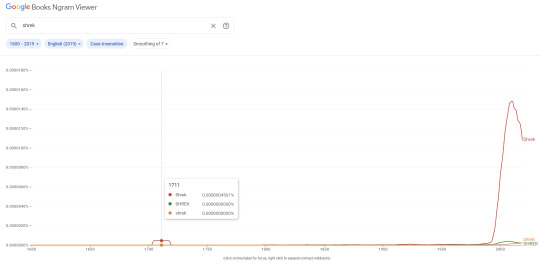
what time traveler was responsible for this?
2 notes
·
View notes
Text
...but on the other hand, english is a battle-royale-free-for-all kind of language: if you want to write it like lightswitch or waterbottle, who exactly is going to stop you? it's still perfectly communicative, the result is perfectly understandable. you can make YOUR words frot on purpose :)
On a slightly more serious note: I write a lot in english, which is a language I learned later in life. My wife beta-reads for me, english being her mother tongue. We find lots of words where she informs me that this word is not usually hyphenated like this, or compound like that: so we look up the way I wrote it vs. all the other variations (google n-gram viewer used to be good for this) and, almost always, we learn that the way I wrote it has plenty recorded uses overall, but is currently uncommon. And so I say - sure, why can't I use the uncommon one if I like it that way? It's still perfectly understandable, and language is made by those who use it.
We won't have any prescriptivism in this house: my words may fuck as they please.
one thing i hate about english is your open compound words. what do you mean it's a light switch and not a lightswitch or a water bottle instead of a waterbottle. get real
#languages#prescriptivism vs descriptivism#ritabuuk:#YEAH#from an editing perspective I always point this sort of thing out to be sure that it is intentionally chosen#but english is what we make it to be!#waterbottle and lightswitch seem 100% valid to me#even as I see them get a red underline in the tags as I type it right now#if it registers as correct then it is correct!#I didn't realize this sort of thing happened for us so much for compounds...#the adventures in the ngrams that I remember the most are...#“a chamomile”#technically its “a chamomile tea”#but the ngram revealed that plenty of people seem to be shifting to just saying “a chamomile” in their books#especially from authors from other countries#but all english speakers get a say in how english is spoken!#and why the heck shouldn't it be “a chamomile” let's go!#another one is “snuck”#dictionaries will tell you it should be “sneaked”#but dictionaries are wrong#same deal with “rooves” as the plural for “roof”#apparently it's considered something non-standard and from the boston area#but you know what - people from boston can shape the english language too!#ngrams used to let you see the relevant quote from the book that used the phrase you were looking for#which would be helpful to see if the phrasing really was what you were looking for#or if it meant something else in that book's context#lately it almost never gives the quotes so it's harder to dive into the results :/
49K notes
·
View notes
Text
4-Changes in word trends
Agora (1900s,1910s) "Opponent" - Center Decade: 1910s "Coincidence" - Center Decade: 1900s "Believed" - Center Decade: 1900s "Monosyllabic" - Center Decade: 1910s "Seats" - Center Decade: 1900s
Crete (1900s, 1910s) "Cretan" - Center Decade: 1910s "Given" - Center Decade: 1900s "Rusaprotools" - Center Decade: 1900s "Mounts" - Center Decade: 1910s "Forerunner" - Center Decade: 1900s
Cyprus (1900s, 1910s) "Asia" - Center Decade: 1910s "Tautology" - Center Decade: 1900s "Alia" - Center Decade: 1900s "Considers" - Center Decade: 1910s "Age" - Center Decade: 1910s
0 notes
Text

the pandemic hit the Bruh industry really hard
0 notes
Text
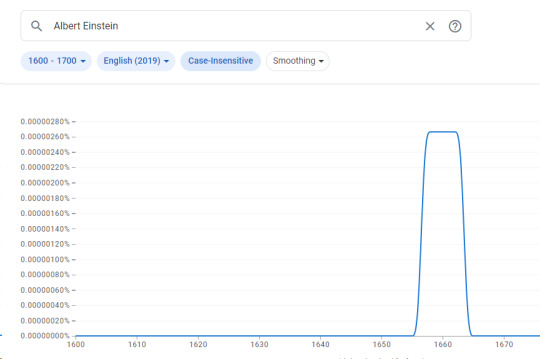
who tf was talking about Einstein in the 17th century??
0 notes
Text
So, Google has this thing called ngram viewer. It searches books for words or phrases to see how common they've been over time. (https://books.google.com/ngrams/info) To save space I threw both "firm but tender" and "quiet precision" in to see what their usage over time looks like. https://books.google.com/ngrams/graph?content=firm+but+tender%2C+quiet+precision&year_start=1800&year_end=2022&corpus=en&smoothing=3
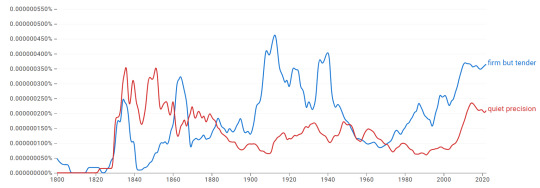
The X-axis is what percentage of 3 word phrases/2 word phrases these make up of the available books from the years on the Y-axis.
There's a post going around about a specific alleged AI fanfic. The author of the post lists a lot of reasons why they believe the fic is AI. Not linking to the post and not commenting on its conclusion, but.
But.
People.
These???? Are all ABSOLUTELY VALID analogies/expressions???
"her nimble fingers worked with quiet precision"
"his grip firm but tender"
"her gown pooling around her like embers"
But the post says that:
fingers don't make sound, so what does quiet precision mean? as opposed to what? her joints cracking with every movement? how is a grip firm but tender? what does that mean? since when do embers pool? the entire fic is littered with these adjectives that contradict each other or just straight up do not make sense, because all an ai does is generate descriptive language with no understanding of what the words it's spitting out actually mean
Come on, man. These are perfectly serviceable! Quiet precision and firm but tender are bog standard fictional expressions. Granted, I've never seen the simile of a dress pooling like embers, but I like it! It evokes!
They are absolutely something that an actual living breathing person would write! (In fact they're so serviceable that if the fic is AI they're probably plagiarised) (although firm but tender is SO common I'm not sure it can be plagiarised? It's like 'toeing off his shoes').
Like, yeah, AI sucks. I agree it sucks.
But analogies or expressions that aren't a one to one match for truth (reality? observable fact? whatever, you get what I mean) are not bad?? They don't mean a fic was written with AI?? They're what makes writing GOOD. Makes it interesting.
Sure, 'her nimble fingers moved like bones and tendons covered by skin because they were bones and tendons covered in skin, but her movements were so expertly precise that no one noticed just how super precise they were' might be entertaining. briefly.
But the whole POINT of metaphor and simile is to evoke a reaction. An emotion.
There's a post by silentwalrus that I cannot find (thanks tumblr search), and it's pissing me off, because they perfectly talked about this! About metaphor and how to write original and effective ones (something they're VERY good at). The example was something like 'he did a thing like a scorpion hidden under a bush' and pointing out that if you looked at it too close it didn't make sense, but it evoked a reaction.*
A clever or strange or evocative analogy or expression does not mean it was written by AI.
____________________________
*I may be misremembering the details, and if so I apologise; it was a long time ago, but I'm positive it involved a scorpion.
#ngram viewer#it's super useful for looking at language trends#but also at shifts in spelling#you can also throw in names#there are ways to restrict or expand the search#basically if you like language this is a fun toy#I use it for editing when I want to know which version of a word that has multiple accepted spellings is the best one
919 notes
·
View notes
Text
god, I love leftovers. Thank you, refrigerators and freezers, microwaves, etc., for the ability to make one of the five dishes I willingly consume and eat it the entire goddamn week.
#refrigerator appreciation post#freezer appreciation post#I wrote a whole list of questions I have about the development of the concept of “leftovers” but I scrapped it because too goddamn long#like no one wants to hear me ask a bunch of questions I could answer but won't because that requires finding and reading research or source#because I can't let myself be inaccurate can i#no I am compelled to be as accurate as possible in my dumbass rabbithole expolorations and that takes too many characters#I had two screenshots of the Google Ngram Viewer
0 notes
Note
where does ‘bugfuck’ come from? ive never seen anyone else say it but you’ve evidently been on the bugfuck train for years now
According to Google Ngram, the word "bugfuck" first starts to show up in the printed corpus of the English language around 1970, though it's probably older than that in spoken use. The earliest citation I've personally been able to chase down is the 1975 edition of Steven Phillip Smith's American Boys (therein spelled "bug-fuck"), which suggests it may have its roots in American military slang.
1K notes
·
View notes
Text
I actually did this once. You can just look it up, because anything that's in the Google ngram corpus is in Google Books, so you can just search Google Books with a date restriction and find whatever Google ngram was finding.
In my case I wanted to know why there was a spike of uses of the word "blog" in the 1920s. And it turned out that in some fonts, BLDG and BLOG are pretty hard to tell apart.
I am deeply fond of Google's n-gram viewer, but the amount of text in the years before 1800 is relatively low, both because not nearly as much text was written, and because not nearly as much survived to be scanned in. So if you put any words in and graph them, then expand the time range, you inevitably get stuff like this:
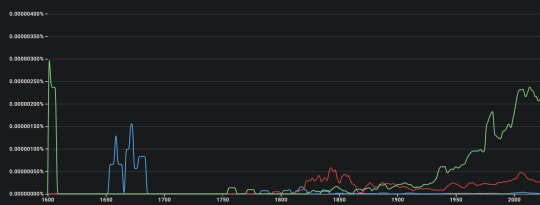
That giant spike right at the start in green almost certainly does not represent people using the word I was searching for. It probably represents a single occurrence of the n-gram, and might just be its occurrence in a miscataloged book that's actually from a later year. The data is relatively good, but not that good.
But I'm always left feeling like I should go seeking out the book, just to make sure. It feels like it should be a pertinent mystery.
32 notes
·
View notes
